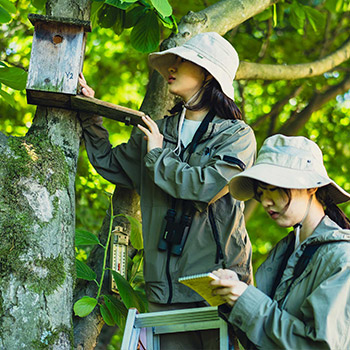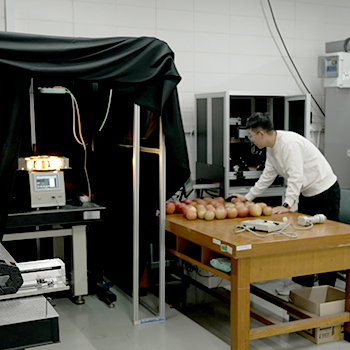Department of Forest Sciences
☎ +82-2-880-4750
200-6208
The Department of Forest Sciences specializes in nurturing forests and the sustainable use of forest resources which includes the direct and indirect use of forest products. Recognizing that forests are environmental resources, the Department of Forest Resources and the Department of Forest Products have been reorganized into the Department of Forest Sciences, offering two programs: forest environmental science and environmental materials science.
With the expansion of global desertification, the destruction of tropical rain forests, and the increase in greenhouse gases the need for forest resource conservation has become a very important issue from an environmental perspective.
The major in forest environmental science major covers important issues and emphasizes the various virtues and functions of forests and environmental resources. The students in this major focus on how to maintain and enhance the functions of forest ecosystems, how to efficiently manage and use forest resources, and how to restore the destroyed environments or disturbed ecosystems. This course of study aims to produce well-trained people who are capable of keeping our forest resources (wildlife, forest materials, water, and recreation resources) sustainable, as well as researching methods for efficient conservation, use, and management of forest resources.
The environmental materials science program offers diverse basic and applied courses as well as laboratory and field practices in physics and chemistry to teach students how to utilize wood more effectively and efficiently both in industry and daily life. The major’s study and research material is wood, which is a natural, high molecular, environmentally friendly, and permanently recyclable material; the environmental materials science program deals with the development of a new environmentally friendly bio-material composite, a new technology for producing pulp and paper, a new wood structure, a new chemical utilization of wood components, and a new technology for cleaning pollutants by using forest microorganisms. The major is designed to create and disseminate knowledge about wood, paper science and engineering, and forest products and their utilization, through lectures, labs, and practices.
The goal of the department is to identify and resolve important problems in biology, conservation, management, and utilization of forest resources and to disseminate research results to the scientific community, resource user-groups, and the general public.
With the expansion of global desertification, the destruction of tropical rain forests, and the increase in greenhouse gases the need for forest resource conservation has become a very important issue from an environmental perspective.
The major in forest environmental science major covers important issues and emphasizes the various virtues and functions of forests and environmental resources. The students in this major focus on how to maintain and enhance the functions of forest ecosystems, how to efficiently manage and use forest resources, and how to restore the destroyed environments or disturbed ecosystems. This course of study aims to produce well-trained people who are capable of keeping our forest resources (wildlife, forest materials, water, and recreation resources) sustainable, as well as researching methods for efficient conservation, use, and management of forest resources.
The environmental materials science program offers diverse basic and applied courses as well as laboratory and field practices in physics and chemistry to teach students how to utilize wood more effectively and efficiently both in industry and daily life. The major’s study and research material is wood, which is a natural, high molecular, environmentally friendly, and permanently recyclable material; the environmental materials science program deals with the development of a new environmentally friendly bio-material composite, a new technology for producing pulp and paper, a new wood structure, a new chemical utilization of wood components, and a new technology for cleaning pollutants by using forest microorganisms. The major is designed to create and disseminate knowledge about wood, paper science and engineering, and forest products and their utilization, through lectures, labs, and practices.
The goal of the department is to identify and resolve important problems in biology, conservation, management, and utilization of forest resources and to disseminate research results to the scientific community, resource user-groups, and the general public.

Programs
Program in Forest Environmental Science
Forest environmental science deals with forest-related environments which support the world's most important resources. Forests clean the air, prevent erosion, moderate the availability and quality of water, and provide renewable raw materials for energy, shelter, and paper products.
Forests are habitats for endangered plant species and wildlife. They are important for recreation activities, such as hiking, hunting, and bird and wildlife viewing. At regional and global levels, forests may be significant factors in the climate.
Forest environmental science involves managing forest ecosystems within increasingly complex social environments. A challenging and demanding profession, forestry applies forest ecosystem sciences, management sciences, and communication skills to the conservation and management of forest resources to meet society's ever increasing need for commodities, services, and a healthy environment.
- International Exchange :
Our international short exchange programs collaborate with Hokkaido University in Japan and Bogor Agriculture University in Indonesia in order to improve students’ understanding of the northern hardwood forest and tropical rain forest. During our summer field practice in the University Forest at Mt. Jirisan and Mt. Baegunsan in Jeollanam-do, some of the Japanese students participate in our program and have chance to learn about our forest ecosystem. Since 1999, students who have participated in this exchange program can study at Hokkaido University or Obihiro University of Japan for two semesters. In addition, students can travel with professors to China, Japan, the Philippines, Nepal, Mongolia, Finland, and Russia as researchers or assistants, to experience the ecosystem ranging from tropical to temperate to boreal.
- Career Opportunities :
Career opportunities in research, management, teaching, or consulting are available with private corporations, environmental organizations, universities, environmental consultants, and governmental agencies. Our students may also find employment with public land management agencies, private organizations, the forest products industry, consulting firms, and trade associations.
Forests are habitats for endangered plant species and wildlife. They are important for recreation activities, such as hiking, hunting, and bird and wildlife viewing. At regional and global levels, forests may be significant factors in the climate.
Forest environmental science involves managing forest ecosystems within increasingly complex social environments. A challenging and demanding profession, forestry applies forest ecosystem sciences, management sciences, and communication skills to the conservation and management of forest resources to meet society's ever increasing need for commodities, services, and a healthy environment.
- International Exchange :
Our international short exchange programs collaborate with Hokkaido University in Japan and Bogor Agriculture University in Indonesia in order to improve students’ understanding of the northern hardwood forest and tropical rain forest. During our summer field practice in the University Forest at Mt. Jirisan and Mt. Baegunsan in Jeollanam-do, some of the Japanese students participate in our program and have chance to learn about our forest ecosystem. Since 1999, students who have participated in this exchange program can study at Hokkaido University or Obihiro University of Japan for two semesters. In addition, students can travel with professors to China, Japan, the Philippines, Nepal, Mongolia, Finland, and Russia as researchers or assistants, to experience the ecosystem ranging from tropical to temperate to boreal.
- Career Opportunities :
Career opportunities in research, management, teaching, or consulting are available with private corporations, environmental organizations, universities, environmental consultants, and governmental agencies. Our students may also find employment with public land management agencies, private organizations, the forest products industry, consulting firms, and trade associations.

Faculty
| Name | Major | TEL | |
|---|---|---|---|
| Professor Kang Kyu Suk |
Forest Genetics and Breeding | +82-2-880-4753 | kangks84@snu.ac.kr |
| Professor Park Il-Kwon |
Forest Protection | +82-2-880-4751 | parkik1@snu.ac.kr |
| Professor Kim Hyun Seok |
Tree Physiology | +82-2-880-4752 | cameroncrazies@snu.ac.kr |
| Professor Park Pil Sun |
Forest Ecology and Forest Soil Science | +82-2-880-4771 | pspark@snu.ac.kr |
| Professor Im, Sangjun |
Forest Engineering, Forest Hydrology, Watershed Management, Ecological Engineering | +82-2-880-4759 | junie@snu.ac.kr |
| Associate Professor LEE, YOHAN |
Forest Policy and Economics | +82-2-880-4754 | johnlee@snu.ac.kr |
| Associate Professor Choi, Chang-Yong |
Wildlife Ecology and Management | +82-2-880-4757 | sub95@snu.ac.kr |
| Associate Professor Choe, Hyeyeong |
Landscape Management and Geoinformatics | +82-2-880-4756 | hy.choe@snu.ac.kr |
| Assistant Professor Han, Hee |
Forest Management | +82-2-880-4755 | hee.han@snu.ac.kr |











